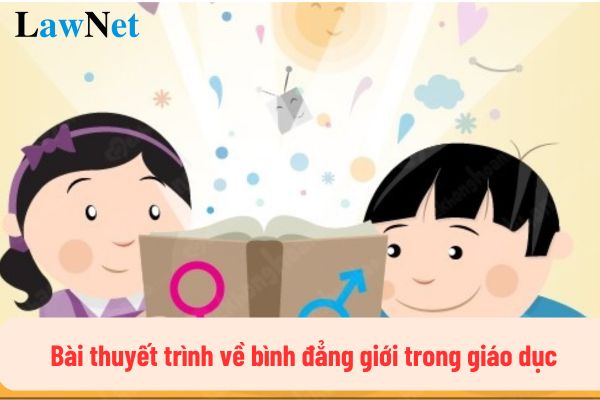Vietnam: What are the briefest sample presentations on gender equality in education? Is being able to summarize presentation content after listening to a skill required for 8th-grade students?
What are the briefest sample presentations on gender equality in education in Vietnam?
Gender equality is about men and women having equal status and roles, being provided with the same conditions and opportunities to develop themselves, contribute to society, and enjoy the fruits of that development.
In other words, gender equality is when both men and women have equal rights in all areas of life, from family and society to politics and economics.
Students and teachers can refer to the following 05 briefest sample presentations on gender equality in education in Vietnam:
|
What are the briefest sample presentations on gender equality in education in Vietnam?
|
*Note: The above information is for reference only./.

What are the briefest sample presentations on gender equality in education in Vietnam? Is being able to summarize presentation content after listening to a skill required for 8th-grade students? (Image from the Internet)
Is being able to summarize presentation content after listening to a skill required for 8th-grade students in Vietnam?
Under Section 5 of the General Education Program for Literature issued in conjunction with Circular 32/2018/TT-BGDDT:
Listening
- Listen and summarize the presentation content of others.
- Capture the main content discussed by the group and be able to present that content.
Interactive Listening and Speaking
- Know how to discuss opinions on an age-appropriate issue in life.
Thus, being able to summarize presentation content after listening to is a skill required for 8th-grade students in Vietnam.
What are the 05 prohibited acts for lower secondary school students in Vietnam?
According to Article 37 of the regulations issued along with Circular 32/2020/TT-BGDDT, the prohibited acts for lower secondary school students are as follows:
- Disrespect the dignity, honor or bodily integrity of teachers, officials and staff of their schools, other people and other students.
- Act dishonestly in learning, examinations or admission process.
- Buy, sell or use alcohol, tobacco, drugs, other stimulants, firecrackers or explosives.
- Use mobile phones and other devices in class for purposes other than learning and without the teacher's permission.
- Fight or disrupt public or school order or security.
- Use or exchange cultural products that incite violence or contain indecent materials; use toys or play games that impede their own healthy development.
- Students shall not commit other prohibited acts provided for by regulations of law.

